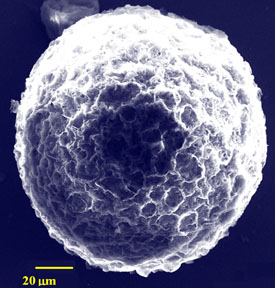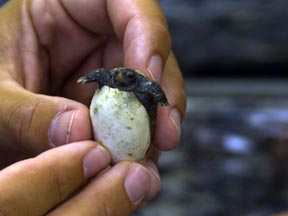April 20, 2012 marked the two-year anniversary of the largest offshore oil spill in U.S. history. University of Alabama at Birmingham researchers continue to seek solutions and measure the impact of the Deepwater Horizon disaster even as public attention drifts.
“We created the UAB Gulf Oil Response Initiative to allow our world-class researchers to study the long-term effect the oil spill has on the environment and the community,” said Thomas M. DiLorenzo, Ph.D., dean of the UAB College of Arts and Sciences.
Minimizing future disasters
 Eugenia Kharlampieva, Ph.D., works with nanotechnology in the Department of Chemistry. It is hard to imagine nanotechnology, the study of matter on a molecular scale, having an impact on an oil spill that covered 580 square miles, but that dream is near reality.
Eugenia Kharlampieva, Ph.D., works with nanotechnology in the Department of Chemistry. It is hard to imagine nanotechnology, the study of matter on a molecular scale, having an impact on an oil spill that covered 580 square miles, but that dream is near reality.
“We have created microsponges that, once they are tested and approved, will be used en masse to absorb surface oil to reduce the immediate danger,” says Kharlampieva. “After absorption, these microsponges will then decompose the oil into safer chemicals and compounds and decrease environmental waste.”
Mickie Powell, Ph.D., a research assistant professor in the Department of Biology, is looking at high-sensitivity toxicity screening of dispersants and residual oil using molecular biomarkers. Elizabeth Gardner, Ph.D., an assistant professor in the Department of Justice Sciences, also is using molecular biomarkers as she researches the effects of oil-degrading bacteria.
“If we track the Deep Horizon spill over time we can better predict the kind of remediation efforts that need to be made in the future,” Gardner says. “We may also be able to identify the kinds of storms and natural occurrences that might cause oil to start appearing again so that communities can be prepared.”
Measuring impact today
Kent Kerley, Ph.D., is an associate professor of criminal justice. Michael Howell-Moroney, Ph.D., is an associate professor of public administration. Together they are looking at the social and attitudinal effects of the oil spill on residents of the Gulf Coast.
They are interested in finding out what residents think about the spill, who they think is to blame and who they still trust. Their survey asks about people’s perception of offshore oil drilling, government involvement and accountability.
 There are nearly 16,000 species that call the Gulf of Mexico home. This includes endangered species like the loggerhead sea turtle that had nearly 70,000 turtle eggs relocated to prevent hatchlings from swimming into the oily Gulf and eating crude-soaked food. It also includes the diamondback terrapin that is listed as the highest conservation concern.
There are nearly 16,000 species that call the Gulf of Mexico home. This includes endangered species like the loggerhead sea turtle that had nearly 70,000 turtle eggs relocated to prevent hatchlings from swimming into the oily Gulf and eating crude-soaked food. It also includes the diamondback terrapin that is listed as the highest conservation concern.
Thane Wibbels, Ph.D., a professor of reproductive biology at UAB, has studied turtles for more than 25 years. He is looking at the genetic implications of relocating the loggerhead eggs and the effect the oil spill — “the worst environmental disaster the United States has faced” — has had on the health and reproduction of the loggerheads.
Small species, large impact
R. Douglas Watson, Ph.D., Karolina Mukhtar, Ph.D., and Shahid Mukhtar, Ph.D., are colleagues of Wibbels in the Department of Biology. Each is looking at the effect of the oil and dispersants in some of the smallest Gulf inhabitants.
Watson, a professor of endocrinology and developmental biology, is studying the endocrine disruption and the impact on basic cellular and physiological processes in invertebrate species.
Shahid Mukhtar, a research assistant professor of functional genomics and systems biology, is researching zooplankton and how it is affected by the Corexit dispersant. Zooplankton is known as the model system for studies in ecology and evolution, and its depletion could set the stage for what he calls “trophic cascades” that could cause the collapse of higher organisms.
Karolina Mukhtar, an assistant professor in plant molecular biology, is studying the toxic effect of the oil spill on turtlegrass. Seagrasses trap and stabilize sediment, restrict water flow, inhibit erosion and promote deposition. Moreover, it serves is a food source for many herbivorous organisms and is a nursery area for many fish.
The pilot grant projects were funded by the Office of Vice President for Research and Economic Development and the deans of the schools that funded the projects. The UAB Gulf Oil Response Initiative funded 16 university projects for a total of $308,344.